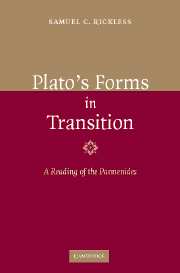Book contents
- Frontmatter
- Contents
- Preface
- List of abbreviations
- Introduction
- Chapter 1 The theory of forms
- Chapter 2 The theory criticized
- Chapter 3 The theory modified: methodology
- Chapter 4 The First Deduction
- Chapter 5 The Second Deduction
- Chapter 6 From the Appendix to the Fourth Deduction
- Chapter 7 From the Fifth to the Eighth Deduction
- Conclusion
- References
- Index of forms discussed
- Index of Deductions
- Index of passages cited
- General index
Chapter 4 - The First Deduction
Published online by Cambridge University Press: 22 September 2009
- Frontmatter
- Contents
- Preface
- List of abbreviations
- Introduction
- Chapter 1 The theory of forms
- Chapter 2 The theory criticized
- Chapter 3 The theory modified: methodology
- Chapter 4 The First Deduction
- Chapter 5 The Second Deduction
- Chapter 6 From the Appendix to the Fourth Deduction
- Chapter 7 From the Fifth to the Eighth Deduction
- Conclusion
- References
- Index of forms discussed
- Index of Deductions
- Index of passages cited
- General index
Summary
In the previous chapter, we saw that there is a method to the Deductions that occupy Parmenides (and his interlocutor, Aristotle) for the rest of the dialogue. The point of the Deductions is to establish eight sorts of results, beginning with the first: that if the one is, then the one is both not F and not con-F in relation to itself and in relation to the others. In the next four chapters, I provide a complete logical reconstruction of all eight Deductions (along with a complete reconstruction of the Appendix to the first two). In this chapter, I concentrate on the First.
Let me begin by highlighting two principles that will play a significant role in the reasoning to be analyzed. Recall that, according to BP, itself a corollary of C, for anything other than the F, partaking of the F is both necessary and sufficient for being F, i.e., X partakes of the F if and only if X is F (see p. 31). The first principle is a stronger version of BP (call it “SBP”):
(SBP) To say that X partakes of the F is to say that X is F.
It should be evident that SBP is stronger than (i.e., entails) BP, but not vice versa. According to SBP, the propositions expressed by “X partakes of the F” and “X is F” are more than merely materially equivalent: they are identical.
- Type
- Chapter
- Information
- Plato's Forms in TransitionA Reading of the Parmenides, pp. 112 - 137Publisher: Cambridge University PressPrint publication year: 2006



